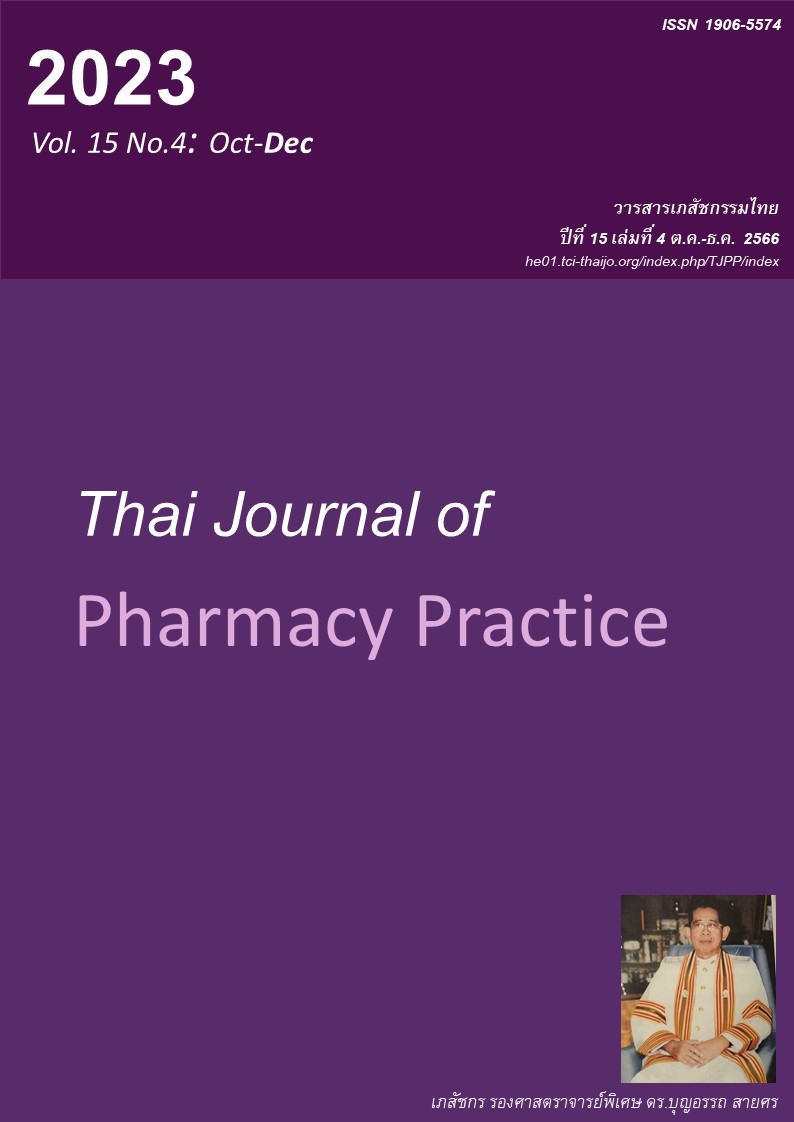ปัจจัยทำนายความร่วมมือในการใช้ยาฉีดอินซูลินของผู้ป่วยโรคเบาหวานชนิดที่ 2 ในคลินิกโรคไม่ติดต่อเรื้อรังของโรงพยาบาลชะอำ
Main Article Content
บทคัดย่อ
วัตถุประสงค์: เพื่อหาปัจจัยทำนายความร่วมมือในการใช้ยาฉีดอินซูลินของผู้ป่วยโรคเบาหวานชนิดที่ 2 วิธีการ: งานวิจัยนี้เป็นการศึกษาเชิงวิเคราะห์ภาคตัดขวาง โดยศึกษาในผู้ป่วยเบาหวานชนิดที่ 2 ที่เข้ารับบริการในคลินิกโรคไม่ติดต่อเรื้อรังของโรงพยาบาลชะอำ ที่กำลังใช้ยาฉีดอินซูลิน ผู้วิจัยประเมินความร่วมมือในการใช้ยาฉีดอินซูลิน โดยใช้แบบสอบถามความร่วมมือในการใช้ยาสำหรับคนไทย และหาปัจจัยทำนายการมีความร่วมมือในการใช้ยาฉีดอินซูลินโดยใช้การวิเคราะห์ถดถอยโลจิสติกพหุ และนำเสนอเป็นค่า adjusted odds ratio (aOR) และ 95% confidence interval (95% CI) ผลการศึกษา: ผู้ป่วยที่เข้าร่วมการศึกษาจำนวน 260 คน อายุเฉลี่ย 50 ± 1.28 ปี และเป็นเพศชายร้อยละ 51.2 จากการประเมินมีผู้ป่วยจำนวน 128 คน (ร้อยละ 49.23) ที่มีความร่วมมือในการใช้ยาฉีดอินซูลิน ประเภทของแพทย์ผู้ตรวจรักษาและความรู้เรื่องโรคเบาหวานของผู้ป่วยมีความสัมพันธ์อย่างมีนัยสำคัญทางสถิติกับการมีความร่วมมือในการใช้ยาฉีดอินซูลิน ผู้ป่วยที่ได้รับการตรวจรักษาโดยอายุรแพทย์มีความร่วมมือในการใช้ยาฉีดอินซูลิน เป็น 1.872 เท่า (OR 1.872, 95%CI 1.120, 3.130) เมื่อเปรียบเทียบกับผู้ป่วยที่ได้รับการตรวจรักษาโดยแพทย์ทั่วไป ผู้ป่วยที่มีความรู้เรื่องโรคเบาหวานผ่านเกณฑ์มีความร่วมมือในการใช้ยาฉีดอินซูลินเป็น 3.086 เท่า (OR 3.086, 95%CI 1.161, 8.201) เมื่อเปรียบเทียบกับผู้ป่วยที่มีความรู้เรื่องโรคเบาหวานไม่ผ่านเกณฑ์ สรุป: ปัจจัยทำนายความร่วมมือในการใช้ยาฉีดอินซูลินที่ระบุได้ในการศึกษานี้ ได้แก่ ประเภทของแพทย์ผู้ตรวจรักษาและความรู้เรื่องโรคเบาหวานของผู้ป่วย ผลการศึกษานี้เสนอแนะว่าควรเน้นการดูแลผู้ป่วยด้วยอายุรแพทย์และส่งเสริมการให้ความรู้เรื่องโรคเบาหวานแก่ผู้ป่วย เพื่อเพิ่มความร่วมมือในการใช้ยาฉีดอินซูลินของผู้ป่วยเบาหวานชนิดที่ 2
Article Details

อนุญาตภายใต้เงื่อนไข Creative Commons Attribution-NonCommercial-NoDerivatives 4.0 International License.
ผลการวิจัยและความคิดเห็นที่ปรากฏในบทความถือเป็นความคิดเห็นและอยู่ในความรับผิดชอบของผู้นิพนธ์ มิใช่ความเห็นหรือความรับผิดชอบของกองบรรณาธิการ หรือคณะเภสัชศาสตร์ มหาวิทยาลัยสงขลานครินทร์ ทั้งนี้ไม่รวมความผิดพลาดอันเกิดจากการพิมพ์ บทความที่ได้รับการเผยแพร่โดยวารสารเภสัชกรรมไทยถือเป็นสิทธิ์ของวารสารฯ
เอกสารอ้างอิง
Diabetes Association of Thailand. Diabetes clinical practice guideline [online]. 2017 [cited Sep 30, 2022]. Available from: www.dmthai.org/attachments /article/443/guideline-diabetes-care-2017.pdf.
American Diabetes Association. 6 glycemic targets: Standards of medical care in diabetes-2018. Diabe- tes Care 2018; 41(Suppl 1):S55-64. doi: 10.2337/dc 18-S006.
Doggrell SA, Chan V. Adherence to insulin treatment in diabetes: Can it be improved? J Diabetes 2015; 7: 315-21.
Lee CS, Tan JHM, Sankari U, Koh YLE, Tan NC. Assessing oral medication adherence among patients with type 2 diabetes mellitus treated with polytherapy in a developed Asian community: a cross-sectional study. BMJ Open. 2017; 7: e016317 . doi: 10.1136/bmjopen-2017-016317.
Stolpe S, Kroes MA, Webb N, Wisniewski T. A systematic review of insulin adherence measures in patients with diabetes. J Manag Care Spec Pharm 2016; 22: 1224-46. doi: 10.18553/jmcp.2016.22.11. 1224.
Cramer JA, Pugh MJ. The influence of insulin use on glycemic control: How well do adults follow prescriptions for insulin? Diabetes Care. 2005; 28: 78-83.
Printrakun R, Songthap A. Factors affecting insulin injecting behaviors among type 2 diabetic patients in Long Hospital, Long District, Phrae Province. Thai Journal of Pharmacy Practice 2021; 12: 346-55.
Awodele O, Osuolale JAJAhs. Medication adherence in type 2 diabetes patients: study of patients in Alimosho General Hospital, Igando, Lagos, Nigeria. Afr Health Sci 2015; 15: 513-22. doi: 10.4314/ahs. v15i2.26.
Cheyoe N. Prevalence and predictors of insulin non-adherence in type 2 diabetes. Journal of Health Systems Research 2016; 10: 333-9.
Van Brunt K, Pedersini R, Rooney J, Corrigan SM. Behaviours, thoughts and perceptions around mealtime insulin usage and wastage among people with type 1 and type 2 diabetes mellitus: a cross-sectional survey study. Diabetes Res Clin Pract 2017; 126: 30-42.
Sittikankaew K, Navicharoen R. Factors related to health promoting behaviors of type 2 diabetes patients with insulin and oral agent therapy. Journal of the Police Nurses 2014; 6: 102-12.
Peyrot M, Barnett A, Meneghini L, Schumm‐Draeger PM. Insulin adherence behaviours and barriers in the multinational Global Attitudes of Patients and Physicians in Insulin Therapy study. Diabet Med 2012; 29: 682-9. doi: 10.1111/j.1464-5491.2012.03605.x.
Prommaloon S, Wattanakitkrileart D, Charoenkit karn V, Peerapatdit T. Factors influencing insulin adherence in patients with type 2 diabetes. Nursing Sciences Journal of Thailand 2017; 35: 61-71.
Lee Y-Y, Lin JL. The effects of trust in physician on self-efficacy, adherence and diabetes outcomes. Soc Sci Med 2009; 68: 1060-8. doi: 10.1016/j.soc scimed.2008.12.033.
Khlaihong, W., Jitramontree, N., & Wirojratana, V. Factors predicting medication adherence behaviors among older adults with type 2 diabetes. The Journal of Faculty of Nursing Burapha University 2016; 24: 65-75.
Faul F, Erdfelder E, Buchner A, Lang AG. Statistical power analyses using G*Power 3.1: Tests for correlation and regression analyses. Behav Res Methods 2009; 41: 1149-60.
Homrot S. Factors affecting medication adherence of type 2 diabetes patients in Bang Krathum Hospital, Phitsanulok Province [master thesis]. Phitsanulok: Naresuan University; 2020.
Suphachamroon A, Lerkiatbundit S, Saengcharoen W. Validity and reliability of the Medication Adherence Scale in Thais (MAST): Testing in Diabetes Patients. Thai Journal of Pharmacy Practice 2018; 10: 608-19.
Tiv M, Viel JF, Mauny F, Eschwège E, Weill A, Fournier C, Fagot-Campagna A, Penfornis A. Medication adherence in type 2 diabetes: the ENTRED study 2007, a French population-based study. PLoS One. 2012; 7: e32412. doi: 10.1371/journal.pone.0032412.
Azri N, Norsa'adah B, Hassan NB, Naing NN. Insulin adherence and associated factors in patients with type 2 diabetes mellitus treated in Klang Primary Health Care Centres. Malays J Med Sci. 2021; 28: 76-87.
Farsaei S, Radfar M, Heydari Z, Abbasi F, Qorbani M. Insulin adherence in patients with diabetes: risk factors for injection omission. Prim Care Diabetes. 2014; 8: 338-45.
Halepian L, Saleh MB, Hallit S, Khabbaz LR. Adherence to insulin, emotional distress, and trust in physician among patients with diabetes: A cross-sectional study. Diabetes Ther. 2018; 9: 713-26.
Promchaisri K, Lerkiatbundit S, Saengcharoen W. Effect of self-efficacy enhancing program on ability to use insulin-penfill injection among patients with diabetes type 2: A randomized controlled trial. Thai Journal of Pharmacy Practice 2019; 11: 648-58.


